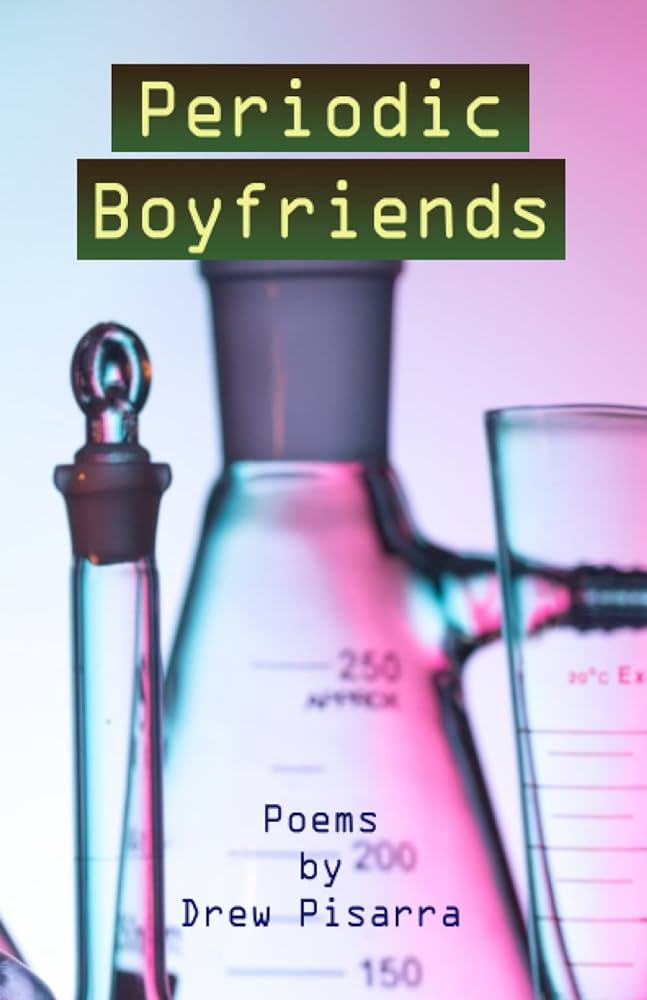The sonnet, as a traditional poetic form, has often been used by writers as a means for depicting and paying homage to a beloved. And, given the enduring presence of the sonnet within poetry, it should be no surprise then that many (from Renaissance writers to the Romantics to our contemporaries) have used, broken, and subverted the form to depict queer desire and relationships. From the anthology of queer classic poetry, Hand in Hand with Love, editor Simon Avery comments in his introduction how many poets have subverted “the form’s roots in the expression of heterosexual love in order to speak of same-sex desire” (xiv). This complication of form and theme has allowed writers over the centuries to pen poems of pining, devotion, shame, and beauty.
Drew Pisarra’s Periodic Boyfriends (Capturing Fire, 2023) is a collection of 118 sonnets (and an introductory poem) about various intimate encounters with men, with each sonnet titled and thematically connected to a different element of the periodic table. Every single element is here, and, just like the periodic table, the sonnets are organized by their increasing atomic numbers (so we start with “Hydrogen” and end with “Lawrencium”). While this framework alone would be incredibly ambitious for any collection, Pisarra takes it a step further by forcing himself to work within the formal constraint of the sonnet. And yet, despite these self-imposed constraints, Pisarra’s poetry playfully explores a wide swath of experiences and feelings, making the collection’s specific vision all the more impressive and admirable.
As a whole, these poems read like a diary of desire, as we are invited in to all kinds of intimate encounters the speaker experiences. In the introductory sonnet “The Periodic Boyfriend,” the speaker evokes many of the elements he will be using and provides us with his intended framing of “Love and Sex possess[ing] like chemistries / when [he] surveys his carnal history” (1). Unlike the lofty, idyllic tropes associated with traditional sonnets, the experiences expressed in these poems feel earthy and grounded. The images evoke the senses, a particular time and place, and speak from the body. The connections formed with these men are often ephemeral, and the speaker’s feelings about them run the spectrum, from pure ecstasy to disappointment (with himself or the partner) to something more vacillating or ambivalent.
The title of the collection introduces us to Pisarra’s playfulness with language, as he makes ample use of wordplay, soundplay, rhyme, and rhythm throughout. In “Hydrogen,” he describes himself as “all sloppy and slurred, / exploring, whoring, roaring drunk into / blackouts I couldn’t fathom or see / outside memory’s anonymity” (3). The wordplay and soundplay add levity to the vulnerability on display, with the humor stemming from a speaker who is intensely self-aware of his own shortcomings. The speaker admits he doesn’t clearly remember every encounter, either due to intoxication or the simple lack of impressions left on his memory. The associations and allusions to the periodic elements help fill in the gaps, providing us extra context and grounding us in a more crystalized somewhere. For example, the man in “Hydrogen” is described as having no scent and a “tall glass of water” (3), while the man in “Neon” is set against the lights of Las Vegas, “doomed to sweat sweat flash-dried by hot air” (12). You can tell Pisarra had a lot of fun playing with these connections. Despite the strict adherence to the small container of the sonnet, the characteristic humor and verve is what kept this reader reading.
While most of the men in these poems remain nameless, the Lanthanides, a later section of the collection, includes poems dedicated to particular people in the speaker’s life. In an especially heartbreaking sonnet, the speaker reflects his connection to his late gay uncle, who was ostracized by the family. He notes how he was invisible even to the speaker, expressing regret not knowing his uncle better when he was alive. It’s implied that the uncle passes from complications with AIDS, with a “tearless” and “sparsely attended” funeral, the speaker noting how his “obit was terse” (94). The inclusion of this poem both at once lets us in more and opens up the collection by its way of looking outward, how the speaker identifies with the uncle despite his lack of knowledge at the time. The feelings here are intensely personal, yet the reflection on family dynamics and the marginalized uncle elevate it to something more universal.
The final section of collection, The Actinides, feels the most contemporary in its navigation of online dating and hookup app woes. There is a return to the anonymity of the previous poems, yet these final sonnets feel the most cynical, with the speaker thumbing through photos online, judging what he sees, and often ending on a note that observes the fleeting nature of these temporary connections. They abandon the traditional end rhyme of the sonnet and there is less of that playfulness, and much more of an acute feeling of isolation and disillusionment. There are reflections on aging and ageism, with the speaker finally noting the hollowness and shallowness of gay app categories in “Lawrencium”: “Should your identity not / be covered by one of our checkboxes, / please choose Other. In matters of Gender, / Race, Lustful Preference, and Body Type, / you be you. We’ll figure out where you fit” (126).
The queer sonnets in Pisarra’s collection explore a variety of moods and moments, preserving what haunts and echoes just as often as the gaps and vanishings. As sonnets, they evoke the sonic and rhythmic trappings of an old form while expanding its possibilities. They aren’t afraid of laughing at (or with) all the tiny absurdities that come with trying to connect with another human being.
Joseph Dante is a writer and editor from Florida. His work has been previously published in Salamander, Permafrost, PANK, South Florida Poetry Journal, and elsewhere. You can find him online at http://josephdante.com.
